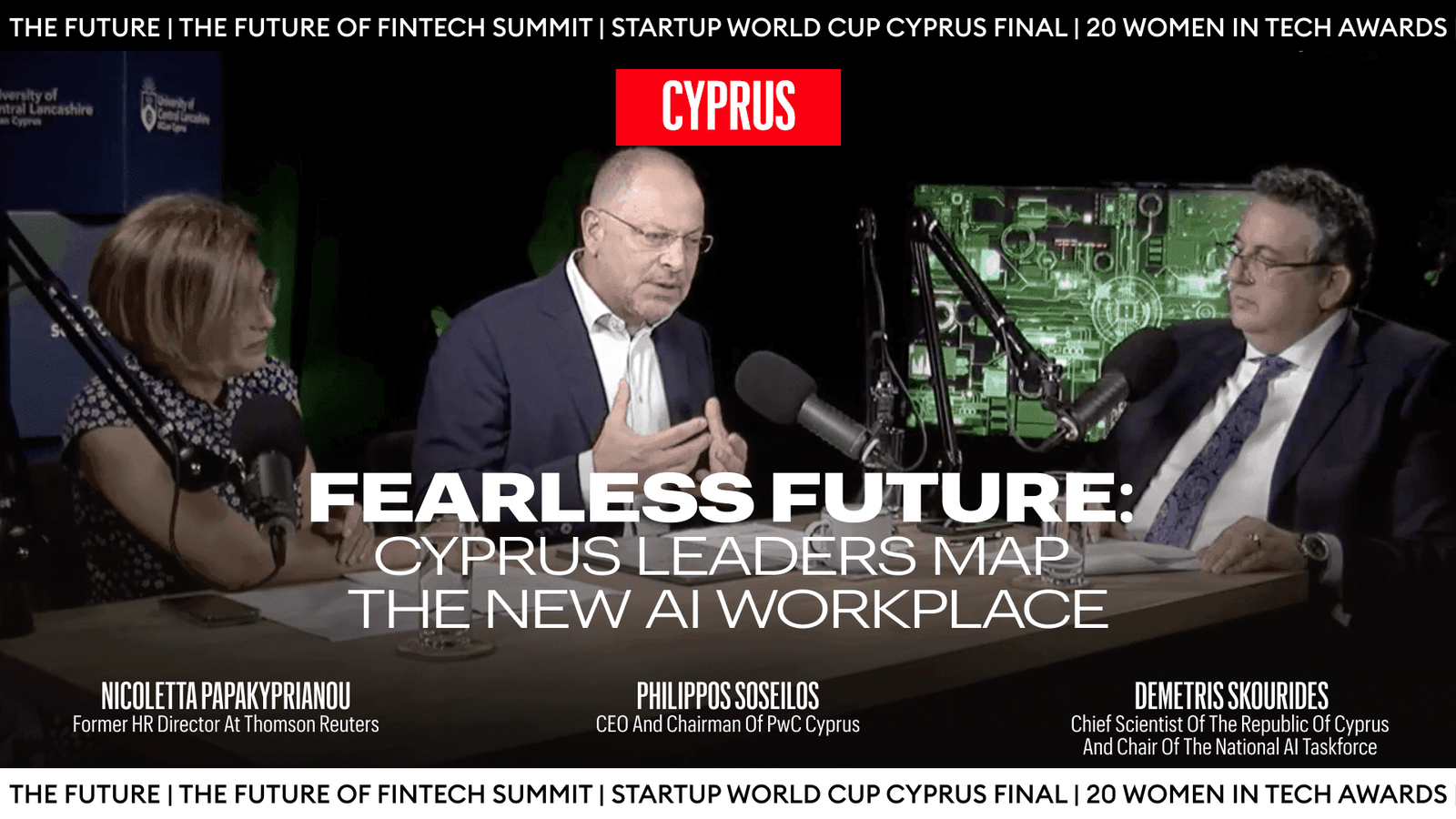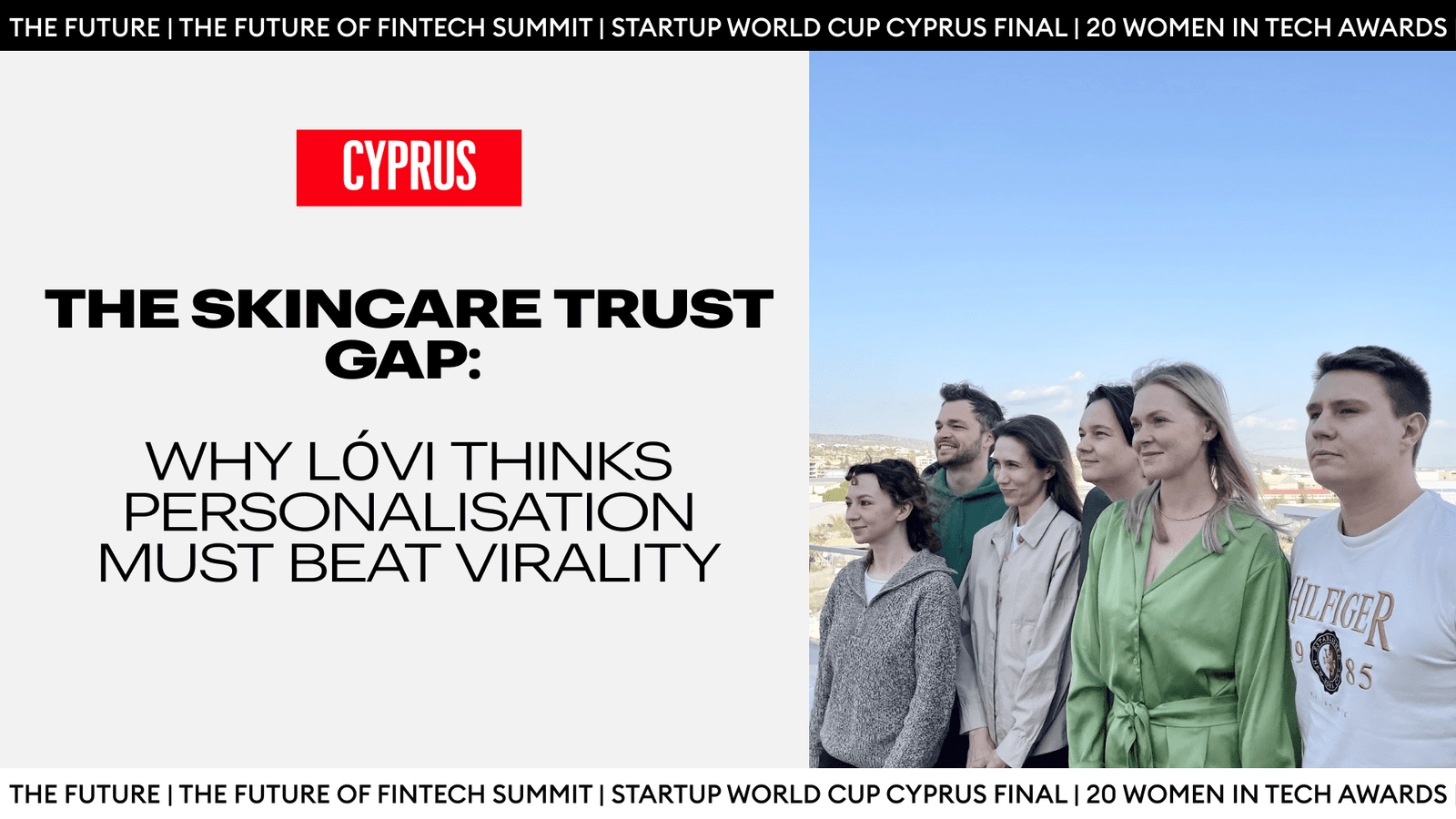On 7 August 2025, the University of Central Lancashire, Cyprus (UCLan Cyprus) hosted the launch of Fearless Future, a new podcast from Demetris Skourides, Chief Scientist of the Republic of Cyprus and Chair of the National AI Taskforce. The first episode, The Future of Work in the Age of AI, featured Philippos Soseilos, CEO and Chairman of PwC Cyprus, in conversation with moderator Nicoletta Papakyprianou, former HR Director at Thomson Reuters and global advisor on workforce transformation.
The discussion drew on the PwC Global AI Jobs Barometer (June 2025) and two other major reports that came out this year, the World Economic Forum’s Future of Jobs Report 2025 and McKinsey’s Superagency in the Workplace (January 2025). These studies agree that AI is expanding opportunities in work, not eliminating them. Roles exposed to AI are commanding wage premiums of 56%, industries adopting it are seeing productivity gains of up to four times, and global job growth from AI adoption could reach 11 million positions.
Follow THE FUTURE on LinkedIn, Facebook, Instagram, X and Telegram
The Vision Behind Fearless Future
The discussion started with Demetris Skourides outlining why he is launching the Fearless Future series. He explained that the timing aligns with the government’s update of the Cyprus AI Strategy 2025–2030 and his goal of addressing common misconceptions about AI.
“There is this constant dilemma of whether Artificial Intelligence can live up to its promise? Will it take jobs? Will it actually have a negative impact on people? [This series is] about creating the necessary awareness and start creating a framework with which we can help people. It’s okay to fear the unknown. It’s a new journey. […] As the government, we will put in the time to really create this awareness, create the education, and the enablement to provide that development to help people move on to this journey, which we want to be as seamless and as transitional as it can be.”
He emphasised the importance of a human in the centre approach:
“I view Artificial Intelligence as an enabling technology that can help every human have a form of a superpower without relegating complete control to language models or solutions […] By having the human in the middle, we can safeguard the quality.”
For Demetris Skourides, awareness is not a soft or optional exercise. He views it as a strategic foundation for preparing the country to adopt AI with confidence. “I think the promise of progress, the promise of actually being more refined, more accurate, having the capability to predict better decisions or to really make more informed decisions, outweighs, I think, the fear,” he explained. “And what I wanted to do with the series is to actually start helping people understand that artificial intelligence is here. It is not just in one industry. It is everywhere. And what we are going to be having to rethink is how do we actually identify where we can use it across the different industries and capture that value.”
By framing AI as both omnipresent and relevant to all sectors, Demetris Skourides positions public understanding as a national asset. For Cyprus, where economic resilience depends on tourism, shipping, professional services, and emerging technology, the ability to capture value will depend on whether each sector can recognise AI’s relevance before other markets move ahead. Building awareness can strengthen the connection between policymakers, industry leaders, and citizens, making adoption more timely and aligned with national priorities.
Data Growth and the Case for AI
Nicoletta Papakyprianou raised the question of how to reconcile the fear of disruption with the promise of progress. In response, Demetris Skourides pointed to the sheer scale of the data challenge. Since 2004, global data has grown 1,800 times, and 90 percent of today’s data was created after COVID. He argued that this explosion leaves no choice but to embrace AI:
“We have three to five times more information to deal with. The only way to be as impactful is to use technology to help us scale and make decisions faster based on that insight.”
He argued that this imbalance between information growth and human capacity makes technology essential for progress. The ability to refine insight, increase accuracy, and predict better outcomes, in his view, outweighs the fear of change.
“Artificial intelligence is here. It is not just in one industry. It is everywhere. And what we are going to be having to rethink is how do we actually identify where we can use it across the different industries and capture that value.”
Therefore, adapting to technology is about transitioning the conversation from what might be lost to what can be gained. The opportunity lies in identifying sector-specific applications where AI can deliver measurable value, and then equipping people with the skills to harness it.
Business Risks and Strategic Priorities
Building on the point that AI is present in every sector, Nicoletta Papakyprianou turned the discussion to the organisational level, asking what challenges employers and employees face in preparing themselves for work and the potential for AI to help bridge this gap.
Philippos Soseilos described the current operating environment as one where instability, volatility, uncertainty, and unpredictability are a given. Technology, he said, is a primary driver of these shifts, but it is not the only one. Industries are seeing blurred boundaries, new value created through the merging of sectors, and business models that challenge traditional positions in the value chain.
Artificial intelligence, in this context, is both a source of competitive advantage and an existential risk. “If [businesses] do not at least be up to date or be able to catch up, they may actually go out of business in a matter of a few years,” he warned.
Adaptation requires moving away from thinking about jobs in static terms and focusing instead on the tasks that make up those jobs.
“We need to rethink and redesign the way we deliver the outcomes necessary for our jobs.”
From PwC’s research, he highlighted five leadership priorities:
- Recognise AI’s transformational potential beyond isolated use cases.
- Treat AI as a growth strategy, not only a cost-saving tool.
- Build a skills strategy that supports rapid upskilling, reskilling, and, when needed, role changes.
- Prepare for agentic AI, autonomous systems acting as “digital colleagues.”
- Maintain clear role boundaries between humans and AI to protect accountability and quality.
He stressed that many organisations are still in the early stages, especially SMEs, searching for internal use cases, but argued that the real value will come from using AI to develop new revenue streams, services, and customer engagement models.
Skills: The New Competitive Edge
The conversation then turned to the workforce implications of this AI-first era. Nicoletta Papakyprianou observed that according to the PwC Global AI Jobs Barometer, reskilling requirements have accelerated by 66 percent in 2025, compared to 25 percent in 2024. She asked what this means in practical terms for companies trying to keep pace and how AI might change the value of employees.
Philippos Soseilos responded by reframing the common fear of job loss. “AI is making employees more valuable,” he said. “The tasks being replaced are the very tasks that people do not really like doing.” By removing repetitive or administrative work, AI allows people to focus on interpretation, governance, creativity, and leadership.
He then went on to explain that this requires a new set of skills. Employees will need technology fluency and familiarity with digital tools, as well as the ability to adapt quickly. “Being excited to learn new things” and applying that learning in practice will be essential. Resilience, curiosity, and the capacity to work alongside both human colleagues and AI systems will define success.
Demetris Skourides added that AI should take over the administrative workload, freeing people to “amplify insight” while maintaining transparency and quality.
All three speakers agreed that in an AI-enabled economy, the most valuable employees will be those who continuously evolve with technology. Lifelong learning is no longer optional; it is a core requirement for relevance and growth.
Conclusion and Recommendations
The first Fearless Future episode delivered a strong central message to the Cypriot public: Artificial intelligence can drive Cyprus’s economic growth when adoption is deliberate, inclusive, and aligned with national strategy.
As the Chairman, Demetris Skourides, explained that the National AI Task Force, which is appointed by the Council of Ministers and made up of experts from research, academia, industry, and law, is now updating the Cyprus AI Strategy for 2025–2030. Its mandate moves beyond policy to practical implementation. The Task Force is currently mapping high-value sectors, identifying game-changing public and private use cases, and planning the infrastructure that will enable AI adoption across the economy.
A central pillar of this work is lifelong learning. Forecasts show that 40–60% of today’s skills will change within the next 18–28 months. To prepare, the Task Force, in collaboration with the Ministry of Digital Policy, Research and Innovation and the Human Resource Development Authority, has launched the first 15 AI-focused workshops nationwide. These programmes are tailored to professions from accountants to lawyers to teachers, helping each adapt their work to the capabilities of AI. The goal is not to leave any worker behind, not to have any professional demotivated by the change, and for any sector unable to capture AI’s value.
These priorities translate into clear actions for the private sector. Business leaders in Cyprus can align with the national direction by focusing on the following:
- Align company AI adoption plans with national strategic priorities.
- Invest early in skills development to match the pace of technological change.
- Identify industry-specific AI use cases that create measurable value.
- Support a human-centred approach that safeguards quality, transparency, and trust.
If the AI Task Force’s vision succeeds, Cyprus will not only adopt intelligent technologies but will lead in showing how a small, service-driven economy can transform into a competitive knowledge economy, with its people, not its machines, at the centre.
The full podcast episode can be watched via Demetris Skourides’s LinkedIn page.














